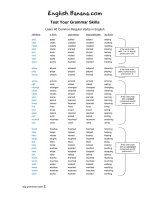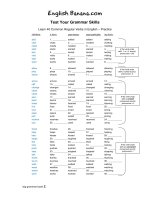regular verbs list different spelling
Bạn đang xem bản rút gọn của tài liệu. Xem và tải ngay bản đầy đủ của tài liệu tại đây (261.27 KB, 1 trang )
www.e-grammar.org/irregular-verbs/
Regular verbs list: different spelling
In English we normally add -ed ending to a verb to make the past simple and the past
participle of regular verbs.
Examples of the past simple: I worked, you worked, he worked.
Examples of the past participle: I have worked, you have worked, he has worked.
Below you can find English verbs that form the past simple and the past participle in a
different way.
1. Regular verbs that end in -e (like, love)
We only add -d (not -ed) to the verb: like - liked, love - loved.
Some of the most common verbs in this category:
analyse, apologise, admire, agree, approve, behave, change, care, bake, argue, appreciate,
bore, breathe, cause, charge, chase, close, compare, complete, like, decide, escape, force,
guide, hate, hope, invite, live, move, manage, notice, owe, phone, recognise, remove, settle,
shave, smile, snore, stare, taste, use
2. Regular verbs that end in a consonant and -y (carry, try)
We change -y into -i: carry - carried, try - tried.
More examples:
accompany, apply, bully, bury, carry, clarify, copy, cry, deny, dry, empty, fancy, fry, horrify,
hurry, identify, imply, marry, multiply, rely, reply, satisfy, supply, study, terrify, tidy, try
Note
We do not change -y into -i if the verb ends in a vowel and -y: play - played.
More examples:
annoy, delay, destroy, enjoy, employ, spray, stay
3. Regular verbs that end in a single vowel and a consonant (stop, admit, travel)
a) We double the consonant in verbs that only have one syllable and end in a single vowel and
a consonant to keep the same pronunciation: stop - stopped, hop - hopped.
More examples:
ban, beg, chat, chop, clap, clip, drop, drag, fit, flip, grab, grin, grip, hug, jog, knit, mug, nod,
pat, plan, rob, shop, skid, scrub, ship, skip, slip, snap, spot, star, stir, thin, top, trip, wrap
b) We double the consonant in verbs with more syllables if the stress falls on the last
syllable: ad'mit - admitted.
More examples:
comit, confer, deter, kidnap, permit, prefer, refer, regret, transfer, transmit
Note
If the stress is not on the last syllable, we do not double the consonant.
Example: 'enter - entered
c) In verbs ending in -l the consonant is always doubled after a single vowel.
Example: travel - travelled.
More examples:
cancel, control, label, marvel, patrol, pedal, quarrel









